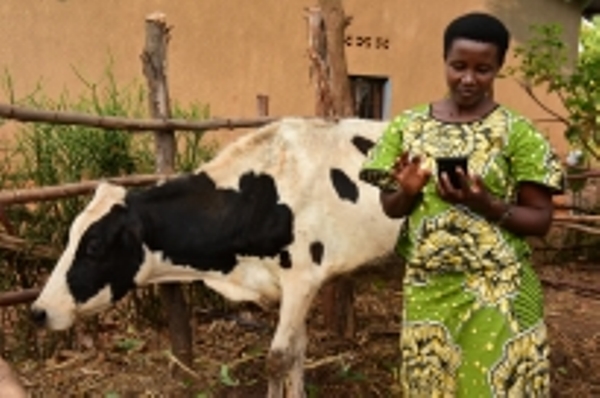
Agriculture is one of the crucial areas that will be leveraged to digitalize Rwanda’s Economy. ©FAO/Teopista Mutesi
The Food and Agriculture Organization of the United Nations (FAO) and Rwanda Development Board (RDB) have unveiled Rwanda’s first ever National Strategy on E-commerce in Agriculture Value Chains to strengthen promotion of online trading in agricultural products to enhance access to markets.
The six-year strategy National E-commerce in Agriculture Value Chains Strategy (2021-2026) builds on the existing digital rapid expansion, and the country’s efforts to promote innovation and use of ICT in boosting agricultural production and increasing the involvement of youth in the agricultural sector.
The Strategy was developed through the FAO project “Support Local supplier’s Capacity Development and Promotion of E-commerce for Agricultural Value Chains in Rwanda”, which also developed webpages for 20 businesses to introduce them and build their capacities on the use of online marketing.
“The E-commerce in agriculture will boost the capacity of SMEs in Rwanda to export and trade efficiently locally, but most importantly will contribute to agribusiness development in the country. The businesses will be empowered to effectively use E-commerce as a tool to strengthen online trading services and products,” Nomathemba Mhlanga, FAO Agribusiness Officer said.
“The E-commerce is even more relevant during the period of the COVID-19 pandemic and future shocks. The E-commerce in Agriculture Value Chains will support small and medium enterprises to better access existing market opportunities without having to leave their respective places of operation. The web pages created will facilitate the businesses to increase online presence. We still need collaboration from all partners in the promotion of E-commerce in Agriculture Value Chains in the country,” Diane Sayinzoga, Head of Special Economic Zones and Exports Department at RDB said.
E-commerce in agriculture in Rwanda
The E-commerce in agriculture value chains is particularly still new and in its early growth. The existing E-commerce instruments are e-soko+ for market price information system and e-portal for import and export products in agriculture.
The use of E-commerce plays an important role in agriculture sector development, especially in reducing post-harvest wastage through improved market efficiency; increasing financial inclusion; time and cost saving; easy market access for inputs; efficient cash management; accountability and transparency; linkage between agricultural researchers, extension agents and farmers; thereby enhancing agricultural production and productivity.
What is E-commerce?
E-commerce, also known as electronic commerce or internet commerce, refers to the buying and selling of goods or services using the internet, and the transfer of money and data to execute these transactions. Alternatively, E-commerce is often used to refer to the sale of physical products online, but it can also describe any kind of commercial transaction that is facilitated through the internet.
Currently the commonly purchased products on the local online markets are personal Computers, mobile phones, travel bookings and clothing, among others.
Priority areas for the strategy
The newly developed E-commerce in agriculture value chains strategy will emphasize promotion and strengthening of national and international trade of agriculture products through safe and reliable E-commerce platforms.
The areas of focus will include building the capacity of farmers’ cooperatives and agribusiness actors to use E-commerce platforms in online trading; raise awareness on the use of the E-commerce platforms in the agriculture value chains; support the establishment and operationalization of a reliable logistical system adapted to the E-commerce in the agriculture value chains; and support the establishment of a conducive policy and legal framework for E-commerce in agriculture value chains. (Fin)
